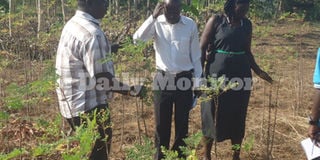Prime
Growing moringa to help HIV/Aids patients boost their immunity, diet

Ministry of Health officials visit Tecoma’s moringa garden. Photo by Simon Peter Emwamu
It is hard to come across people who dedicate themselves to charitable farming so as to help others. But this is happening in a small village in Soroti District known as Amen.
A small charitable organisation, Teso Enterprise Consulting and Marketing Association Uganda (Tecoma Uganda), is purposely growing moringa.
The aim of helping people living with HIV/Aids boost their immunity and balance their dietary needs.
The tree is known for its medicinal properties and nutritional products. But moringa, which is now a disregarded tree among farmers in Teso, because they grew it massively in the early 2000s anticipating lucrative markets in Europe and Asia, which did not materialise.
As a result, many farmers cleared their moringa trees after it emerged that those who had campaigned and encouraged them to grow the tree had hit a dead end in securing the markets abroad.
However, Tecoma Uganda is out to beat the odds by growing moringa as well as encouraging people back into it.
Partner with health centres
The leafy tree, which develops pods when it matures, has been referred to as miracle tree or magic tree, says George William Itiamat, the manager, Tecoma Uganda.
It has a lot of values, most important among is that it is highly medicinal and of nutritional use for humans, farm animals and birds.
So, for the last three years, the organisation is growing moringa on seven acres and has partnered with health centres such as Kapujan and Toroma in Katakwi District.
Through this arrangement, they supply moringa products to HIV/Aids patients free of charge. This includes leaf powder and oil processed from the seeds.
At the health centres, the products are distributed whenever the patients come to pick their ARVs.
Itiamat explains that Tecoma Uganda was driven into this charitable venture because of the plight of most rural people and their inability to achieve a balanced diet in their meals. This makes them vulnerable in the face of the disease.
He points out that moringa leaves can be prepared as sauce; they are rich in all food values and also an energy booster.
“This energy boost is not based on sugar. It is soothing, helps lower blood pressure and is a sleep aid,” Itiamat adds.
One of the beneficiaries of the project, Sam Aurien, notes that the nutritional benefits are as good as eating meat or fish. “In fact, we have also taken the initiative to plant some trees in our backyards, its indeed a magical tree.”
He adds that the sauce prepared from moringa leaves is as tasty as other greens.
Processing products
Besides being eaten by human beings, the plant is also widely used to make medicine. The moringa powder can be mixed with selenium to make immunity-boosting capsules for HIV/ Aids patients.
Besides the leaves and seeds being good as livestock feeds, the powder made from leaves can be used to treat a wide range of bird diseases.
It can be used to purify water. Also, from the seeds, a cooking oil can be processed.
The tree can be planted through two ways; through seeds and by the use of stems.
Unlike other tree plants, the moringa tree takes two years to bear fruits. But, the leaves can be ready for processing after three months.
“The plant grows well in different conditions and does not necessarily need a lot of water,” says Itiamat.
To ensure that products that their patients receive are clean and safe, Tecoma has constructed a permanent drying room.
Here, the leaves are first hang on threads before being spread on the wooden shelves to dry. After this, they are taken to the processing room.
The leaves are often picked from the garden early morning and late in the evening to ensure that the plant is not affected during the plucking.
Rewarding to grow
Henry Tumusimwe, a research officer at the Ministry of Health department which researches on medicinal plants, affirms that moringa is nutritional and medicinal.
He adds it should be used to fight diseases among vulnerable people especially those living with HIV, as well as malnourished children and adults.
For the farmers willing to grow moringa, it is rewarding as well. The current price for a kilogramme of moringa powder is Shs15,000. This is not taking into account all the other products that can be made from it or the various ways it can be used.




